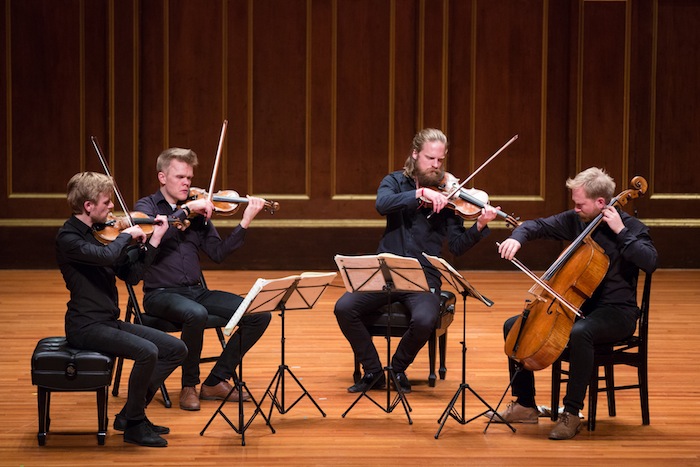Danish String Quartet explores Beethoven and his influences

The Danish String Quartet performed Saturday night at Jordan Hall for the Celebruty Series. Photo: Robert Torres
In 1825 Beethoven penned his String Quartet in B-flat, Op. 130. Sprawling in its structure, the work spans six movements. The finale was a grand fugue, one of the composer’s most dissonant and forward-looking achievements.
When the piece was performed in March of 1826 by the Schuppanzigh Quartet, it received mixed reactions. Anton Schindler and Karl Holz, both secretaries to the composer, disliked the piece, and Holz recording later that audiences only accepted it out of awe for Beethoven. A reviewer for the Allgemeine Musikalische Zeitung was even less sympathetic, calling the quartet “incomprehensible, like Chinese” and part of a “concert only the Moroccans might enjoy.”
Publishers were critical, and Holz pushed Beethoven to write a new finale to the quartet and publish the fugue separately as Grosse Fuge, Op. 133. Ever since the first performance, debate has raged over its place in the original quartet. Arnold Schoenberg championed the fugue as the proper ending, a result of the composer’s true artistic vision.
That is how the Danish String Quartet sees the quartet. In their Celebrity Series recital Saturday night at Jordan Hall, the ensemble offered Beethoven’s original conception, a work as thought-provoking as one of his grandest symphonies.
The telos of the original Op. 130 quartet is the Grosse Fuge. The movement is a dense web of dissonance and competing ideas cast in a dramatic structure that looks back to Bach and ahead to Bartók at the same time. In the hands of the Danish musicians the fugue swirled with intensity for twenty minutes of concentrated energy.
In the rest of the quartet, however, the Danish Quartet played without the sharp-edged or bright-toned sonorities that mark the Juilliard and Emerson Quartet’s approaches. Instead, their sound is smooth and clean while brimming with energy and forward momentum. The piece, as they played it, was a narrative of diverse musical styles. The third movement had a gentle lyricism. Dance movements seemed to whirl about in place with phrases coming to rest on beaming chords. The ever-changing themes of the first movement seemed to spin like silver thread. The aria-like Cavatina was haunting.
Less profound but no less adventurous is Alfred Schnittke’s String Quartet No. 3, which the Danish Quartet also performed Saturday night. The piece is a riff on the principal theme from Beethoven’s Grosse Fuge and Orlando di Lasso’s Stabat Mater. Shostakovich’s signature motive, D-E-flat-C-B,(DSCH) makes an appearance in the work’s grinding finale. In all, Schnittke’s quartet transforms these elements into a dialogue between divine perfection and human experimentation.
The Danish Quartet’s refined sound brought a radiant warmth and humanity that was palpable even in the work’s thorniest dissonances. The stretches Renaissance-like polyphony sounded flutelike and distant. The quartet played the Beethovenian phrases of the second movement with power and energy, twisting the theme with agitated statements. The fragments of the Stabat Mater, sounding with glowing warmth trough the stinging harmonies, haunted the work like a ghost.
The opener was Beethoven’s String Quartet, Op. 18 No. 4. For being cast in C minor, this string quartet beams with sunlit lines.
The Danish Quartet’s approach brought those aspects to the fore. The scherzo took on a delicate bounce, and the Menuetto glided with dance-like grace. Textures were colorful, even glassy. There were moments of stirring drama in the outer movements, where the musicians punched out Beethoven’s syncopations with precision. Development sections took on a sudden drama that transcends the composer’s style. Beethoven, in end, remains eternally contemporary.
The next concert by the Celebrity Series will feature the Berlin Philharmonic Wind Quintet in music by Mozart, Aho, Ligeti, and Nielsen 8 p.m. Friday at Jordan Hall. celebrityseries.org; 617- 482-6661
Posted in Performances